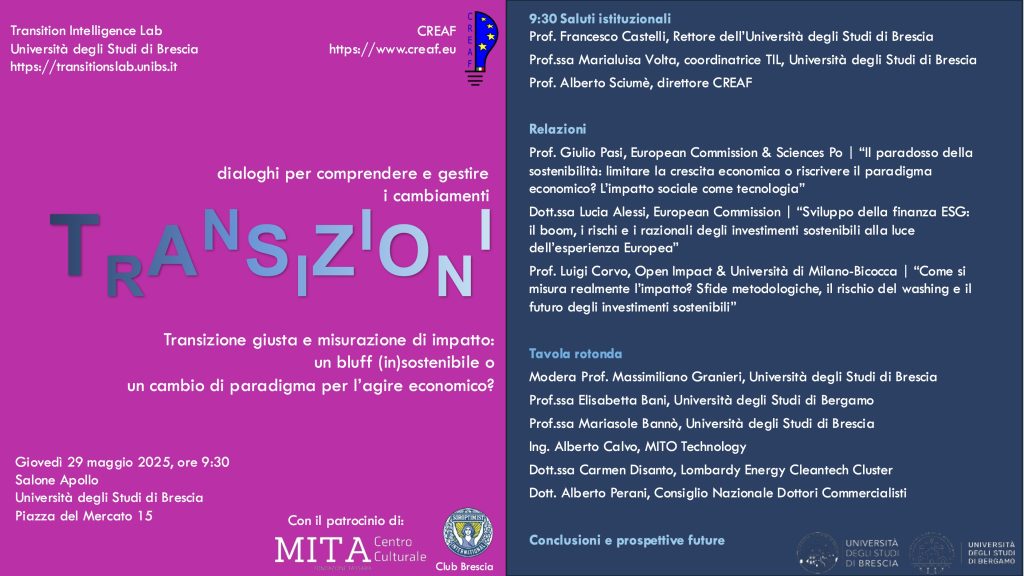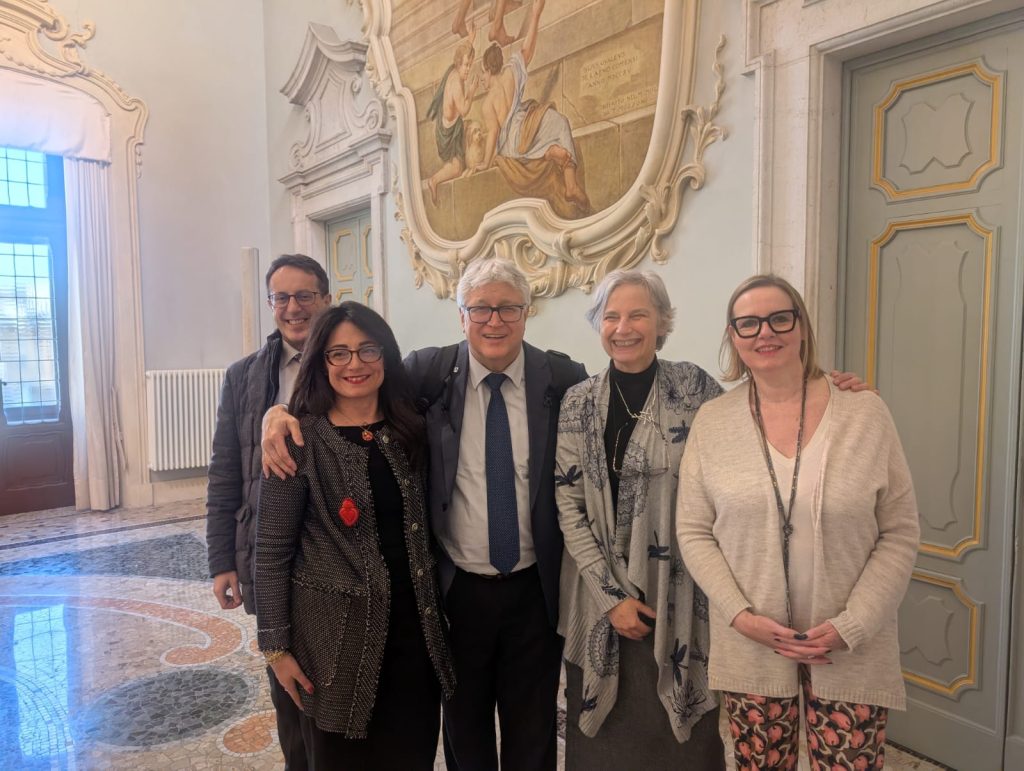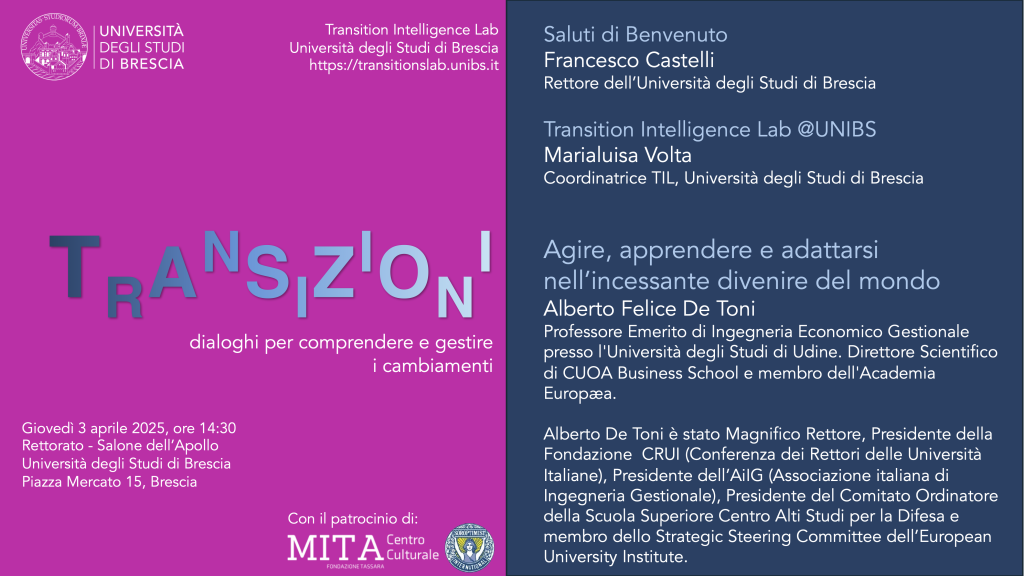Past events
Clear Science, Dark Science: Awareness as the Key to the Future of Research
September 26 2025, 3:15pm. Santa Giulia Museum (Brescia)
On September 26, as part of the European Researchers’ Night, Gianfranco Pacchioni – Professor at the University of Milan, member of the National Academy of the Lincei, the European Academy, the European Academy of Sciences, and the Istituto Lombardo Accademia di Scienze e Lettere – was interviewed by Professor Massimiliano Granieri on the topic “Clear Science, Dark Science: Awareness as the Key to the Future of Research.”
Professor Pacchioni offered a lucid and thought-provoking reflection on the evolution of scientific research over recent decades. While science has always been the driving force behind technological progress, what has changed profoundly are the actors shaping it.
In the past, research was primarily public, aimed at the common good and supported by academic and governmental institutions. Today, alongside it, we find a growing realm of private research, dominated by Big Tech companies that invest aggressively thanks to vast financial resources, pursuing ambitious goals such as quantum computing, brain–machine interfaces, space exploration, health technologies, and, of course, artificial intelligence.
Adding to this picture is the contribution of military research, which by its very nature is secret and inaccessible. The result is a clear contrast between “clear” science, which is public and transparent, and “dark” science, which is private and confidential — a contrast that raises profound questions about the future of knowledge and the ethical and social responsibilities of research.
The central message of Professor Pacchioni’s lecture was a call for awareness: understanding the forces that shape the world of research is essential to ensure that scientific progress remains in the service of society, rather than becoming the privilege of a few.
_______________________________________________________________________________________________________
May 29 2025, 9:30am. Apollo Room, University of Brescia
Just Transition and Impact Measurement: An (Un)sustainable Bluff or a Paradigm Shift in Economic Action?
Co-organized by the Transition Intelligence Lab and CREAF
Is the increasing focus on impact measurement and just transition signaling a deep transformation in economic practices—or is it at risk of becoming an empty narrative?
The seminar was jointly organized by the Transition Intelligence Lab and the Centre for European Affairs (CREAF) at the University of Brescia. The theme addressed by the speakers—reflected in the title of the seminar—concerned sustainability as a goal of European policies, particularly within the framework of regulations governing financial intermediaries and products.
The proceedings were opened by Professor Sciumè, who emphasized how this field is marked by a tension between conflicting interests—namely, those of economic growth and sustainability. While achieving a balance between the two would be desirable, such equilibrium has yet to establish itself as a guiding principle. Adherence to the value of sustainability often appears, he noted, to stem more from a priori commitment than from a carefully reasoned assessment.
Professor Giulio Fasi introduced the topic from an economic perspective, explaining how the transition and the climate crisis confront us with decisions often influenced by a preference for static equilibrium, that is, the preservation of the status quo. This tendency, however, merely postpones the critical juncture at which more radical choices will become unavoidable. Professor Fasi also observed that the current predominance of technocratic power over political authority results from the weakening of representative legitimacy, which has, in turn, led to the strengthening of technical expertise and of the administrative apparatus that embodies it.
Dr. Lucia Alessi, from the European Commission, provided a technical overview of the complex set of rules that have been established to govern financial markets from a sustainability perspective, reflecting an expanded conception of corporate social responsibility.
Professor Luigi Corvo discussed the conceptual foundations of the current economic framework, rooted in the Weberian conception of the firm as a social device that creates added value out of resource scarcity. Within this paradigm, profitbecomes the sole indicator of entrepreneurial success, and corporate accounting practices are structured accordingly. The State, in this model, plays a merely regulatory and redistributive role, setting the rules and collecting taxes for redistribution. However, this Weberian conception can be considered outdated insofar as it overlooks the fact that the transformation of production factors by firms often involves the use of public resources. The introduction of non-financial reporting aims to ensure the capacity to measure social impact, not merely economic performance.
During the roundtable discussion, conducted by Professor Massimo Granieri, participants addressed issues such as impact assessment, change management, the balancing of competing interests, and emerging regulatory approaches, from a range of perspectives: legal (Professor Bani), social (Professor Bannò), entrepreneurial (Dr. Carmen Di Santo), financial(Dr. Alberto Calvo), and accounting (Dr. Alberto Perani).
Registration: EventBrite link

_______________________________________________________________________________________________________
Acting, Learning, and Adapting: Navigating Complexity with Resilience
On April 3, 2025, in the Apollo Room at the Rectorate of the University of Brescia, Professor Alberto F. De Toni (University of Udine) delivered a captivating lecture on the challenges and opportunities posed by complex systems in an era defined by uncertainty and rapid transformation.
Drawing on the insights presented in his recent book, “Decalogo della complessità. Agire, apprendere e adattarsi nell’incessante divenire del mondo” (2024), Professor De Toni proposed a paradigm shift in how we understand and manage complexity. Rather than seeking static equilibrium or rigid control, he argued, we must embrace a dynamic logic of action, learning, and adaptation — the three fundamental processes that enable individuals, organizations, and societies to remain resilient and thrive amid continuous change.
According to De Toni, complexity is not a problem to be solved, but a context to be inhabited — a condition that demands awareness, flexibility, and a capacity for collective intelligence. His talk offered both a conceptual framework and practical reflections on how to cultivate these capabilities within institutions, enterprises, and policymaking.
The event fostered a rich dialogue among participants from academia, industry, and public administration, highlighting how the principles of complexity science can inform strategic decision-making and innovation across multiple domains.
Book (free download): De Toni (2024) Decalogo della complessità. Agire, apprendere e adattarsi nell’incessante divenire del mondo
Video of the event here, slides here.


_______________________________________________________________________________________________________
From Citizens to Customers: Rethinking the Human Model in Contemporary Governance
On November 5, 2024, Professor Alberto Sciumè offered a thought-provoking lecture tracing the evolution of anthropological models over the past two centuries, exploring how our understanding of the individual has changed in relation to society, politics, and technology.
Starting from the individual-centered view of the 19th century, Professor Sciumè outlined how the focus gradually shifted toward collective frameworks — socialism and nationalism — that placed the individual within broader social and political movements. With the Italian Constitution of 1946, this trajectory culminated in the affirmation of the concept of the Person, understood as a moral and social agent endowed with rights and responsibilities within a democratic order.
From the 1980s onward, however, a new transformation has emerged. Driven by technological innovation, market expansion, and the rise of digital platforms, the Person has increasingly been overlaid by a new profile — that of the Customer. In this model, the individual is “satisfied” not only through the consumption of material goods, but also through personalized content, tailored experiences, and algorithmic mediation that align with individual preferences.
The discussion invited the audience to reflect on the implications of this shift for European governance systems: What happens when citizenship is reframed in market terms? How does this affect participation, representation, and the sense of belonging to a shared political community?
Professor Sciumè’s analysis shed light on a crucial contemporary issue — the transition from citizens to customers — raising fundamental questions about the future of democracy, identity, and the very meaning of public life in the age of digital capitalism.
_______________________________________________________________________________________________________
Transitions: Understanding and Managing Change
On Tuesday, October 29, 2024, the evocative halls of the MITA Cultural Center in Brescia hosted a multidisciplinary event titled “Transitions: Understanding and Managing Changes.” The evening brought together scholars, professionals, and members of the public to reflect on how transitions — social, economic, cultural, and environmental — are reshaping our collective experience.
Co-organized by the Transition Intelligence Lab of the University of Brescia and the MITA Cultural Center, the event opened with welcome remarks from Flavio Pasotti, President of the Fondazione Tassara.
The academic session began with Professor Massimiliano Granieri (University of Brescia), who presented the mission and activities of the Transition Intelligence Lab, highlighting its role in connecting research, policy, and innovation to better understand the dynamics of transition.
In his talk “Da una riva all’altra: transizioni come rischio o come possibilità?” , Professor Giovanni Valagussa (Università Cattolica of Brescia, MITA Curator) explored the notion of transition through the lens of art and culture, showing how artistic expression captures the potential inherent in change.
Professor Mariasole Bannò (University of Brescia), in her contribution “La transizione nel management: dalla gerarchia all’inclusione” (Transition in Management: From Hierarchy to Inclusion), examined how organizations are evolving from rigid, top-down structures toward more inclusive and adaptive models capable of integrating diversity and creativity.
Turning to the energy domain, Professor Sergio Vergalli (University of Brescia) delivered a lecture titled “Transizione Energetica tra passato e futuro” (Energy Transition Between Past and Future), tracing the evolution of energy systems and emphasizing the need for forward-looking strategies that reconcile growth and environmental responsibility.
Finally, Professor Marialuisa Volta (University of Brescia), in her presentation “Strumenti per gestire le transizioni”(Tools for Managing Transitions), offered an overview of analytical and modeling approaches that can help policymakers and institutions anticipate, manage, and steer transitions within complex systems.
The event concluded with an engaging open discussion and final remarks, where participants reflected on the interconnections between the various perspectives presented and on the need for shared tools, values, and languages to navigate transformation responsibly.

_______________________________________________________________________________________________________
Modeling Change: Tools to Navigate Transitions
On October 1, 2024, Professor Marialuisa Volta opened the meeting with a presentation focused on tools for guiding transitions, emphasizing the critical role of mathematical models in shaping the future.
During her talk, Professor Volta illustrated how these models can be used to design potential future scenarios, identify key decision points, and map strategic pathways to achieve desired outcomes. By translating complex social, economic, and environmental dynamics into structured representations, such models provide policymakers, organizations, and researchers with the ability to anticipate challenges, evaluate options, and optimize interventions.
The presentation highlighted the importance of combining quantitative analysis with qualitative insights, reinforcing that effective management of transitions requires both rigorous modeling and a deep understanding of the broader social context.
This event underscored the value of foresight and planning in navigating periods of change, showing how advanced analytical tools can transform uncertainty into opportunity and support informed, resilient decision-making in an increasingly complex world.
_______________________________________________________________________________________________________
Understanding Governance Through Transitions
On July 29, 2024, at 2:30 PM, Professor Leonida Tedoldi from the University of Bergamo delivered a compelling presentation on how the concept of transition can be used to understand the succession of governance systems.
Professor Tedoldi challenged the common assumption that changes in governance occur solely through discontinuity or crisis. Instead, he proposed that transitions provide a lens to interpret change as continuity, even within highly complex political and administrative processes. By focusing on the mechanisms and patterns of gradual transformation, transitions allow for a more nuanced understanding of how governance systems evolve over time.
During the ensuing discussion, Professor Tedoldi explored the characteristics of various transitions, illustrating his points with numerous examples from recent history. These case studies highlighted how political, social, and institutional shifts often unfold through incremental adaptation, learning, and systemic evolution, rather than abrupt rupture.
The session offered participants a valuable perspective on analyzing political and organizational change, emphasizing the importance of continuity, complexity, and context in understanding governance dynamics.
_______________________________________________________________________________________________________
Exploring the Energy Transition: Perspectives from Research
On June 24, 2024, Professor Sergio Vergalli delivered an insightful presentation on the energy transition, drawing on his extensive research to examine its key characteristics and implications.
The discussion highlighted how the energy transition is multifaceted, encompassing not only technological and economic dimensions, but also social, environmental, and organizational aspects. The session revolved around several core themes: resources, technologies, markets, impacts, economic development, quality of life, social organization, energy conservation, and the environment.
Professor Vergalli emphasized the interconnectedness of these factors, showing how shifts in energy systems influence—and are influenced by—societal structures, market mechanisms, and environment. The audience engaged in a rich and stimulating discussion, exploring the trade-offs, opportunities, and challenges inherent in transitioning toward cleaner energy systems.
The meeting provided participants with a comprehensive perspective on how energy transition affects multiple layers of society and the economy, underscoring the importance of integrated approaches for planning and managing change in the energy sector.
_______________________________________________________________________________________________________
Bioethics and Responsibility in Transitions
On Monday, May 27, 2024, at 2:30 PM, in Room S of the Faculty of Medicine at the University of Brescia, Professor Adelaide Conti presented key insights from her research in the field of bioethics, focusing on the ethical dimensions of change and transition.
The presentation underscored how individual and collective responsibility play a central role in navigating transitions, particularly in contexts where scientific, technological, or societal developments have profound ethical implications. Professor Conti illustrated how ethical reflection can guide decision-making, ensuring that transitions are managed in ways that are just and socially responsible.
The ensuing discussion engaged participants in a rich dialogue about the interplay between ethics, governance, and societal change, highlighting the importance of fostering a culture of responsibility at both personal and collective levels.
_______________________________________________________________________________________________________
Transitions in Agriculture: Challenges and Opportunities
On Monday, April 29, 2024, at 2:30 PM, in the DEM Meeting Room at the University of Brescia, Professor Paolo Ajmone Marsan from Università Cattolica delivered a lecture on recent transitions in agriculture, exploring how the sector is evolving in response to environmental, technological, and socio-economic pressures.
Professor Ajmone Marsan highlighted the dynamic changes affecting agricultural systems, including shifts in production practices, resource management, and market structures. He emphasized how these transitions are not merely technical, but involve broader social, economic, and environmental dimensions, influencing rural communities and food security.
The discussion following the lecture allowed participants to reflect on the challenges and opportunities that agricultural transitions present, from adopting innovative technologies to balancing economic development with environmental stewardship.
_______________________________________________________________________________________________________
Language and Transitions: Understanding Change Through Communication
On Monday, March 25, 2024, at 2:30 PM, in the Putti Room of the Department of Law at the University of Brescia, Professor Valerio Villa delivered an engaging presentation on the role of language in transitions, exploring how linguistic transformations both reflect and shape social, cultural, and institutional change.
Professor Villa illustrated how language evolves alongside society, influencing the ways in which ideas, norms, and policies are communicated and understood. He emphasized that the shifts in terminology, discourse, and meaning are not merely symbolic but can actively facilitate or hinder transitions, affecting public perception, policy implementation, and collective action.
The discussion following the lecture highlighted the interconnections between communication, interpretation, and change, offering participants a deeper appreciation of how language serves as both a mirror and a driver of transformation in complex systems.
_______________________________________________________________________________________________________
Kickoff Meeting: Launch of the Laboratory’s Activities
On Monday, February 12, 2024, at 2:30 PM, in the DIMI Meeting Room at the University of Brescia, the kickoff meeting for the laboratory’s activities was held, marking the official start of its research and collaborative initiatives.
The meeting set the stage for the objectives, structure, and planned projects of the laboratory, providing participants with an overview of its mission, methodologies, and strategic priorities. Attendees had the opportunity to discuss the laboratory’s role in exploring transitions across social, economic, technological, and environmental domains, and to engage with the planned programs and upcoming events.
This inaugural session fostered interdisciplinary dialogue and collaboration, establishing a foundation for ongoing research, knowledge exchange, and practical applications of the laboratory’s work.
The kickoff meeting marked the beginning of an ambitious program aimed at understanding and guiding transitions in complex systems, uniting scholars, students, and professionals around shared goals and methodologies.
_______________________________________________________________________________________________________
Establishment of the “Transition Intelligence Lab”
On December 19, 2023, the Department of Management and Industrial Engineering (DIMI) at the University of Brescia (Italy) officially approved the establishment of the Research Laboratory “Transition Intelligence Lab”.
The laboratory is dedicated to studying transitions across social, economic, technological, and environmental systems, with a focus on understanding the dynamics of change, identifying drivers and barriers, and developing tools and methodologies for effective management. Its interdisciplinary approach brings together expertise from engineering, management, economics, and social sciences, aiming to provide both theoretical insights and practical solutions for navigating complex transitions.
The Lab represents a hub for exploring the challenges and opportunities of change, supporting decision-making, policy design, and development strategies.
